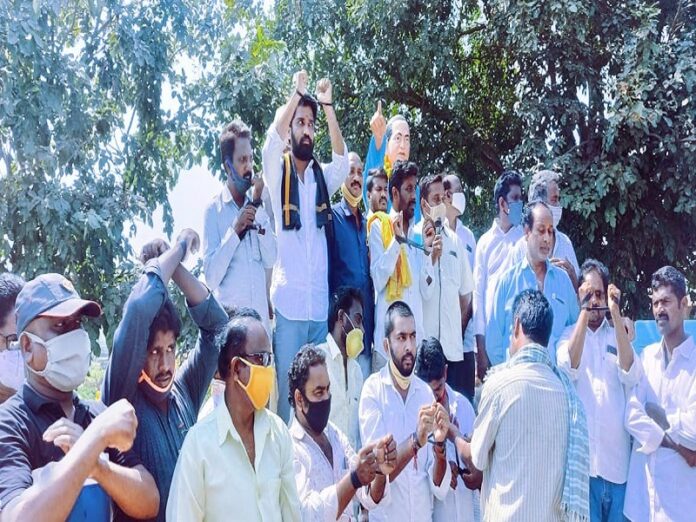Ever since the YSRCP government has assumed power, allegations are rife that Andhra Pradesh police are treating marginalised in inhumane manner, and stifling dissent. On October 28, seven farmers were handcuffed by Andhra Pradesh Police while protesting in Amaravati against the government’s move to shift the state capital to Visakhapatnam.
The incident has drawn national attention as five of those arrested are Dalits and two belong to Other Backward Classes. Not only has the National Human Rights Commission (NHRC) taken cognisance of the matter, the opposition Telugu Desam Party (TDP) has lambasted the Y.S. Jaganmohan Reddy government for meting out inhumane treatment to farmers.
Given the criticism unleashed against the state government, six constables, who were involved in the incident when escorting arrested farmers from Narasaraopet sub-jail to the central prison in Guntur, have been placed under suspension. Andhra Pradesh home minister Mekathoti Sucharita too expressed regrets. But these moves come across as too little, too late.
The SC and OBC farmers were arrested and sent to judicial custody on Monday. On Tuesday, they were subjected to COVID-19 tests before being shifted to the prison in Guntur. The police arrested them on charges of “obstructing a section of Dalits from entering their villages.”
The arrested farmers were a part of a gathering of protesters who had assembled in Amaravati from different parts of the state to protest the YSRCP government’s capital shifting decision. That the police did not even apply their mind in handling the protesters is evident from the fact that they have foisted a case under SC and ST (Prevention of Atrocities) Act against five Dalits, who were among those subjected to handcuffing.
The Supreme Court in 1995 held that minimal freedom of movement cannot be cut down by the application of handcuffs or other hoops. It had categorically stated that the handcuffing of prisoners without judicial consent was illegal.
In the landmark Supreme Court case of Prem Shankar Shukla v. Delhi Administration (1980), the court held that indiscriminate use of handcuffs by the police is a violation of the right to personal liberty guaranteed under Article 21 of the Indian constitution.
According to the court, handcuffing is legal only if the arrestee is: (a) involved in serious non-bailable offences (b) previously convicted of a crime, of desperate character, likely to commit suicide, or likely to attempt to escape. The use of handcuffs and the reasons for their use must be recorded.
Representative image. Opposition TDP alleges that police have been unleashing a reign of terror in the state after the YSRCP government assumed power. Photo: Special arrangement
But it is explicitly clear that the current case involving farmers does not attract either of the provisions mentioned in the police manual. So, it is clear that the police have brazenly overstepped the rule of law just to please their political bosses, says V.S. Krishna, convener of the Andhra Pradesh Human Rights Forum.
Telugu Desam Party politburo member Varla Ramaiah moved NHRC, seeking to rein in the police machinery, which he has accused of unleashing a reign of terror against opposition parties at the behest of the ruling party.
The YSR Congress government, headed by Jaganmohan Reddy, after all, has set an anti-Amaravati mood in its symbolic war against his predecessor N. Chandrababu Naidu, and the police are doing more than what they are asked to so as to be in the good books of the helmsmen of the government, G. Gangadhar, a whistle-blower doctor heading the OBC cell of the AP Congress Committee, has told #KhabarLive.
Gangadhar has also moved the National Human Rights Commission (NHRC) after he was implicated in a case by the CID sleuths for his comment in a TV debate, on the fact that the government will lose the battle against COVID-19 if it loses the frontline warriors like the doctors.
The National Crime Records Bureau (NCRB) in its latest data has revealed that Andhra Pradesh stood sixth among states with a crime rate of 227.9 cases per one lakh population in the year 2019, while Haryana topped the list with 386.4 cases per lakh. There has been an increase in crime against women – 17,746 cases were filed in 2019 as against 16,348 in 2018. Of the total cases in 2019, 7,851 cases relate to domestic violence by husbands and his relatives, 1,086 rape cases (542 below 18 years and 542 above 18 years), 112 dowry deaths, 589 kidnap cases and three acid attacks were recorded.
“When asked to bend by our political masters, we are crawling,” laments a senior police officer. “The agitation against shifting of the capital is a political issue and it is the political agenda of the Jaganmohan Reddy government to fizzle it out. But the police department has arrogated to itself the burden of the political agenda,” the officer has added, wishing not to be identified.
The observations of the police officer hold water if the cases of tonsuring and rape of a Muslim minor girl recently serve as any pointers. A station house officer and two other constables were arrested after they tonsured a Dalit youth allegedly at the behest of a local ruling party leader. The leader behind the tonsuring case managed to go off-the-hooks.
In another case of rape, involving a Muslim minor girl, the police filed a counter case under the SC and ST (Prevention of Atrocities) Act against the victim’s father allegedly under pressure from the local YSR Congress leaders, who pressurised victim family to withdraw the rape case. The victim’s father Shaik Sattar attempted self-immolation on the premises of the district collectorate at Kakinada in the first week of October.
Allegations are abound in the state that the police have made as mere tools to execute the agenda of the party in power in the state. The trend appeared to have set in since 2004 when Jagan’s father Y.S. Rajasekhar Reddy rode to power.
After Jagan came to power in 2019, appointments and postings of senior police officers all the way down to DSPs are allegedly being made with the involvement of Chief Minister’s Office (CMO), resulting in direct political interference in the functioning of the police department.
Miffed over the goings-on in the department, at least half a dozen senior IPS officers have opted for central services on deputation in the last 18 months since Jagan took over as chief minister.
Recently, the Andhra Pradesh high court admonished state director general of police (DGP), Gautam Sawang, while hearing a habeas corpus petition in relation to a case of missing person in state’s East Godavari district.
Indupalli Venkatarama Raju, a resident of Amalapauram in East Godavari district, had mysteriously gone missing after being summoned by the police for questioning in a case.
The high court bench headed by Justice Rakesh Kumar on September 15 had asked the DGP to resign if he could not keep his forces under control.
Earlier, the high court also made critical observations against the DGP when opposition leader N. Chandrababu Naidu was arrested in Visakhapatnam after he had been served with notices under Section 151 of the CrPC during his Praja Chaitanya Yatra.
Referring t tonsuring cases reported each in East Godavari and Visakhapatnam districts and the arrest of a 66-year-old woman, Ranganayaki, at Guntur district by CID personnel for sharing a Facebook post on the gas leakage in a Visakhapatnam plant, Gangadhar said it is high time that police are reined in to uphold free speech. #KhabarLive #hydnews







